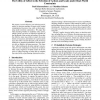Free Online Productivity Tools
i2Speak
i2Symbol
i2OCR
iTex2Img
iWeb2Print
iWeb2Shot
i2Type
iPdf2Split
iPdf2Merge
i2Bopomofo
i2Arabic
i2Style
i2Image
i2PDF
iLatex2Rtf
Sci2ools
ICAI
2009
2009
The Utility of Affect in the Selection of Actions and Goals Under Real-World Constraints
We present a novel affective goal selection mechanism for decision-making in agents with limited computational resources (e.g., such as robots operating under real-time constraints). We argue that when deciding whether to undertake some action, affective states can serve as subjective estimates of the likelihood of that action succeeding. Given that the affective states may reflect, in part, the recent history of successes and failures for a given action type, their roles in action selection can be viewed as analogous to temporal probabilistic decision models such as Markov decision processes. We show how "affect-influenced decision making" can provide low-cost mechanisms to break out of potentially costly sequences of failed actions in the absence of either knowing or being able to compute the actual utility of performing a particular action.
Affective States | Artificial Intelligence | ICAI 2009 | Limited Computational Resources | Temporal Probabilistic Decision |
| Added | 18 Feb 2011 |
| Updated | 18 Feb 2011 |
| Type | Journal |
| Year | 2009 |
| Where | ICAI |
| Authors | Paul W. Schermerhorn, Matthias Scheutz |
Comments (0)

